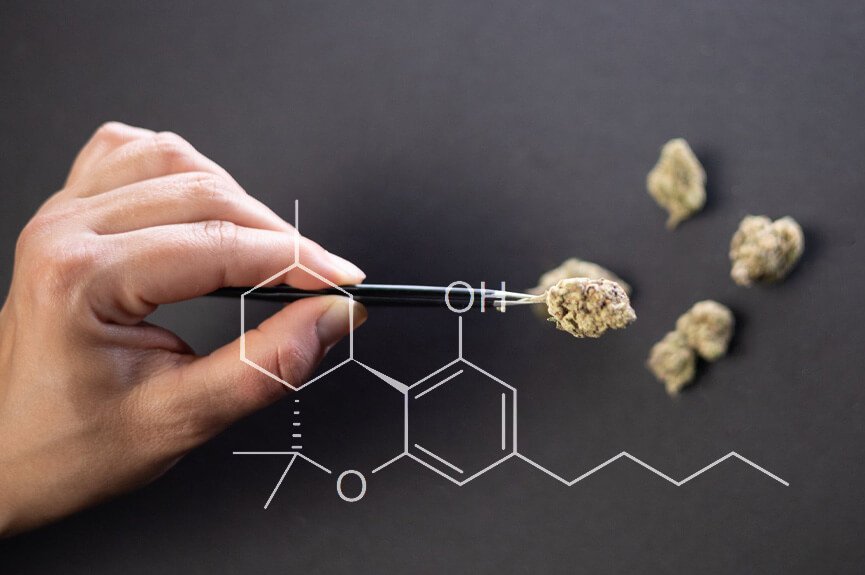Hexahydrocannabinol (HHC) itself is a tetrahydrocannabinol metabolite that has been hydrogenated. It’s a biologically active phytocannabinoid that’s only been found as a detectable molecule in Cannabis derivatives. Roger Adams became the first to synthesize HHC in 1947, utilizing natural THC from Cannabis sativa. Combining citronellal and olivetol, and other similar chemicals, several research groups have successfully synthesized (+)-HHC and (-)-HHC.
HHC is considered semi-synthetic compound, if manufactured in a laboratory. Specific cannabinoids having the capacity to contend with their genealogy are identified from low-THC cannabis compounds. When a certain quantity of hydrogen is delivered to a THC component, it changes its chemical composition and produces HHC. After that, a metal catalyst is introduced to cause the chemical to react. This catalyst speeds up the process without impairing the result. HHC is produced as a result of the total chemical process, which does not occur naturally.
Platinum, palladium, and nickel are the most common catalysts utilized in the manufacture of HHC. When the reaction is finished, the metal catalysts are removed.
What Is the Risk of HHC?
There is limited evidence on the protracted and instant effects of HHC, as there is with all of the current hemp-derived cannabinoids. In reality, many cannabinoids, including HHC, have no defined doses.
How Potent Is HHC?
Concerns about the potency of HHC are yet to be resolved. But studies suggest that HHC has the same impact on the mind and body as THC, but the extent of these effects are yet unknown. Since HHC has significant higher strength than THC, so it is safe to say that high dose of HHC could cause intense effects in users.
According to some HHC users, HHC produces a pleasant and medium cerebral high. HHC has also been claimed to provide pain relief, just like THC. Some people indicate that after taking HHC for recreational purposes, they feel smart, active, and strong.
HHC’s Effects and Potentials
HHC is the first cannabinoid that closely resembles Delta-9 THC among those that have lately been released. The chemical makeup and therapeutic potential of HHC is identical to Delta-9 THC, unlike Delta-8. As a result, many people have experienced pain reduction, anxiety relief, brain and bodily relaxation, and enjoyment after taking HHC.
Even though much research is still being conducted to better understand HHC, certain studies have connected HHC to cancer cures. HHC has been found to decrease tumors in patients with cancer, among several other synthetic and natural cannabinoids. This is fantastic news for HHC and also its prospects as a medical cannabinoid in the future.
Does HHC Show Up On A Drug Test?
With the premise that the semi-synthetic cannabinoid can dodge drug tests, many individuals are turning to HHC. However, the only evidence that supports this notion is anecdotal. The majority of the assertions are based on hearsay. These assumptions have still not been conclusively demonstrated in any way, according to James Stephens, Vice Chairman of Innovation at Creo, and an organic cannabinoid ingredient manufacturer. He did say, however, that HHC might not metabolize to 11-hydroxy-THC, which is a common drug test metabolite. HHC can elude drug tests if it does not convert to 11-hydroxy-THC.
There is currently no solid data to support the allegation that HHC does not show up on drug testing. Don’t stake your professional reputation and employment on hearsay and circumstantial evidence.
Is HHC Legal?
This is undoubtedly the most difficult HHC question. Yes, we’d agree if the HHC is naturally gleaned from hemp with less than 0.3% THC. HHC should be safe based on this information. On a federal scale, HHC gummies, consumables, and vapes are lawful. HHC contains pollen and seeds from hemp, according to other justifications for its legality.
HHC is a great option for a powerful and effective CBD product. The benefits of using this product are undeniable, and users everywhere are sure to find it beneficial and enjoyable.

